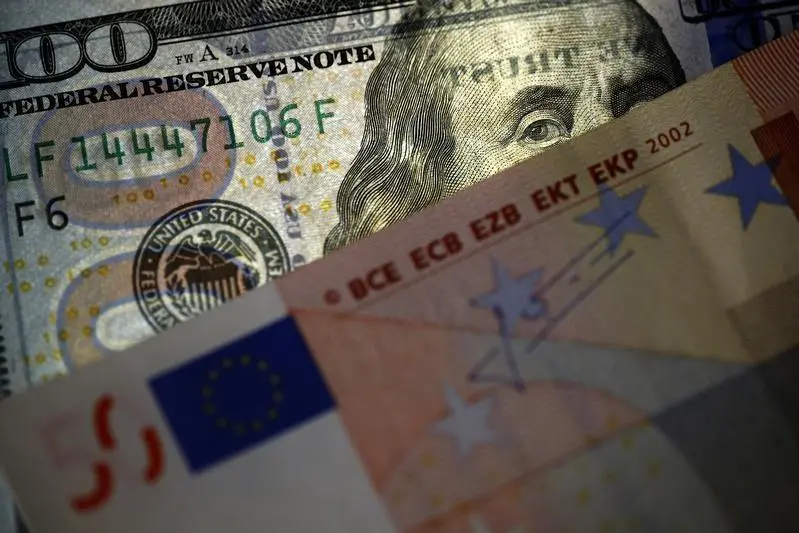PHOTO
SINGAPORE/LONDON - The dollar hovered near recent highs on Monday as investors digested China's somewhat disappointing weekend stimulus announcements, while the euro extended its fall ahead of a central bank meeting this week.
The euro was down 0.1% at $1.092850, falling for an 11th time in 12 sessions as investors priced in a widely expected 25 basis point interest rate cut from the European Central Bank at its Oct. 17 meeting, with data pointing to deteriorating euro zone activity.
"Given the lagged effects with which policy operates it is hard to argue for more 'wait and see', clearly policy is too restrictive," said Lloyds Bank strategist Sam Hill in a note.
"The issue for (ECB) President Lagarde will be how to communicate the shift without unsettling the hawks still obsessing with the rear-view mirror."
Currency moves were sluggish as Japanese markets were shut for Sports Day, while U.S. Treasuries were also unlikely to provide much of a lead since bond markets were closed for Columbus Day.
The pound trod water near one-month lows at $1.30595.
The dollar index was just above 103 and closing in on last week's peak, its highest since mid-August, on the back of traders reducing bets on further jumbo rate cuts by the Federal Reserve at its remaining policy meetings this year.
Currency moves in major markets were tepid last week. The yen and euro both fell around 0.3% each, sterling shed 0.4% and the dollar index climbed 0.4%.
Last week's U.S. data showing slightly hotter-than-expected consumer inflation, but higher weekly jobless claims have left intact expectations for the Fed to cut rates by 25 basis points in November and December.
Traders next have on their radar Thursday's retail sales and jobless claims data in the U.S., in addition to the ECB's policy review.
Fed Governor Christopher Waller - a supporter of a larger rate cut because he is worried the pace of price increases is undershooting the Fed's target - speaks later on Monday.
CHINA STIMULUS DISAPPOINTS
Trading in Asia was dominated by Beijing's fiscal stimulus briefing. China's yuan fell 0.3% against the dollar, while the Aussie, whose fortunes are closely tied to China, was down 0.3% at $0.67320.
China said on Saturday it will "significantly increase" government debt issuance to offer subsidies to people with low incomes, support the property market and replenish state banks' capital as it pushes to revive sputtering economic growth.
Without providing details on the size of the fiscal stimulus being prepared, Finance Minister Lan Foan told a press conference there will be more "counter-cyclical measures" this year.
"More time may be needed for more thought-out and targeted measures," said Christopher Wong, currency strategist at OCBC in Singapore.
"But those measures also need to come fast as markets are eagerly waiting for them. Over expectations vs under-delivery would result in disappointment."
The onshore yuan has fallen nearly 1% against the dollar since Sept. 24, when the People's Bank of China kicked off China's most aggressive stimulus measures since the pandemic.
The New Zealand dollar was down 0.3% at $0.60895, following last week's 0.8% drop after the central bank slashed rates by a half point and hinted at further cuts to come.
In digital currencies, bitcoin firmed 1.8% to a ten-day high of $64,104, while ether was last up 3.1% after hitting a two-week high of $2,546.35.
(Reporting by Vidya Ranganathan in Singapore; Editing by Jamie Freed and Jan Harvey)





















